 The 31st October was and is, of course, All Hallows Eve or Halloween. Although it was a religious festival in medieval and Tudor times, it has its roots in Pagan celebrations and it comes from Samhain, the Celtic new year festival which was celebrated from sunset on 31st October to sunset on 1st November. On that night, it was believed that the veil between the world of the living and that of the dead was at its thinnest and that the souls of the dead and evil spirits could walk the earth. Church bells were rung, bonfires were lit and people wore masks to ward off these spirits and to send them on their way. Farm buildings and homes were also blessed to protect them from evil spirits and witches.
The 31st October was and is, of course, All Hallows Eve or Halloween. Although it was a religious festival in medieval and Tudor times, it has its roots in Pagan celebrations and it comes from Samhain, the Celtic new year festival which was celebrated from sunset on 31st October to sunset on 1st November. On that night, it was believed that the veil between the world of the living and that of the dead was at its thinnest and that the souls of the dead and evil spirits could walk the earth. Church bells were rung, bonfires were lit and people wore masks to ward off these spirits and to send them on their way. Farm buildings and homes were also blessed to protect them from evil spirits and witches.
When Pope Gregory III chose 1st November as a day to remember and honour the apostles and all the saints and martyrs of the Church in the 9th century, the traditions associated with Samhain became incorporated into this and the evening of 31st October became a night to mark the passage of souls through Purgatory, the place where souls resided between death and the Last Judgement.
A popular tradition on All Hallows Eve was for poor people and children to go “souling”. This involved going door-to-door begging for alms and spiced cakes known as soul cakes. Each soul cake was said to represent a soul in Purgatory and in exchange for a cake the souler would promise to pray for the dead of that household.
Another tradition associated with Halloween was apple bobbing, which started out as young people diving for apples stuck upon a hanging beam which had a lit candle at the other end. Their hands were tied behind their back and they could only use their mouths to bit at the apple. It also appears to be customary to crack nuts with one's teeth or to fling the nuts into the fire and watch them crack. It is unclear how old these practices with nuts and apples are, but in the early 19th century book Observations on Popular Antiquities John Brand and Henry Ellis note that the author of a letter printed in a book in 1728 wrote of his servants demanding apples, ale and nuts for the last day of October. Another name for Halloween does appear to have been Nutcrack Night, although one source says this is because it was customary for nuts to be cracked at this time for their seeds to be used in charms and divinations (Superstitions and Folk Remedies, Charles Raymond Dillon). Whatever the truth of the matter, do have fun with soul cakes, apple bobbing, ale drinking and nut-cracking this Halloween. It's not just fun, it's history!
In the following video, I use a traditional Tudor recipe to make soul cakes:
Members can also enjoy my Claire Chats video on medieval ghost stories - click here.
(Text taken from 31 October of our Feast Days section).



I miss Duck Apple Night. That’s what we did as kids, put some apples in a bowl of water and try to catch one with your teeth with hands behind our backs or on string, bobbing about trying to bite one. Now that was innocent fun.